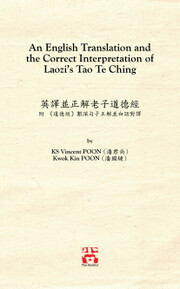Tao Te Ching
道德經
Background information
Tao Te Ching (《道德經》, or Dao De Jing), presumably written by Laozi (老子) of the 6th century BC, is one of the most famous and influential philosophical works in Chinese history. Written in fewer than 6000 Chinese characters, Tao Te Ching outlines the characteristics and roles of the fundamental Tao (道) and its Te (德, Manifestation of Tao) in the formation and maintenance of all in the Universe. Remarkably, it also depicts the underlying nature of governance and some natural laws, which, surprisingly, include modern scientific concepts such as atomic theory, chemical equilibrium, polarities, and the quantum uncertainty principle.
Unfortunately, Tao Te Ching is often misinterpreted by many for more than two thousand years. Their failures are mainly attributed to applying Taoist Religion (道教), Huang-Lao (黄老), and Confucian concepts in interpreting characters such as “鬼”, “神”, “仁”, “慈”, “善”, and “德”. Further, “若”, “似”, and “或” are also frequently misinterpreted, giving rise to the incorrect impression that Laozi was a scheming and calculating philosopher. Prominent interpreters of the past and present, including Heshang Gong (河上公), Wang Bi (王弼), Gao Heng (高亨), and James Legge, have all committed these types of errors in varying degrees.
This book provides readers with an annotated, line-by-line, concise, consistent, and correct English translation and interpretation of Tao Te Ching. Accompanied 674 footnotes include references and brief discussions on general misunderstandings. Further, to facilitate easy reading, the bare translated text is supplemented in a separate section, while the correct interpretation of difficult and complex sentences in vernacular Chinese (《道德經》艱深句子正解並白話對譯) in another. Accordingly, this book is perfect for anyone interested in Chinese philosophy.
Original Chinese Text
(Wang Bi's 王弼 Edition)
English Interpretation
by KS Vincent Poon (潘君尚) and Kwok Kin Poon (潘國鍵)
第五十六章 Chapter 56
____
152. 知者不言,言者不知。塞其兑,閉其門,挫其銳,解其分,和其光,同其塵,是謂玄同。
Those who understand (知) Tao do not speak of it; those who speak of Tao do not understand it. One should close off (塞) one’s senses (兌), shut one’s door connecting the outer world to the inner mind, conceal (挫) one’s brilliance (銳), embrace one’s simplicity to disintegrate (解) all chaos (分), harmonize (和) one’s splendour (光) to make it agreeable, and adapt and merge (同) with one’s muddy and obscure surroundings (塵). Such is known as “The Deep and Mysterious Unification with Tao and the Universe (玄同)”.
153. 故不可得而親,不可得而踈;不可得而利,不可得而害;不可得而貴,不可得而賤。故為天下貴。
第五十七章 Chapter 57
154. 以正治國,以奇用兵,以無事取天下。
155. 吾何以知其然哉?以此:天下多忌諱,而民彌貧;民多利器,國家滋昏;人多伎巧,奇物滋起;法令滋彰,盜賊多有。
156. 故聖人云:我無為,而民自化;我好靜,而民自正;我無事,而民自富;我無欲,而民自樸。
第五十八章 Chapter 58
157. 其政悶悶,其民淳淳;其政察察,其民缺缺。
158. 禍兮福之所倚,福兮禍之所伏。孰知其極?其無正。正復為奇,善復為妖。
159. 人之迷,其日固久。是以聖人方而不割,廉而不劌,直而不肆,光而不燿。
第五十九章 Chapter 59
160. 治人事天莫若嗇。夫唯嗇,是謂早服;早服謂之重積德;重積德則無不克;無不克則莫知其極;
161. 莫知其極,可以有國;有國之母,可以長久;是謂深根固柢,長生久視之道。
第六十章 Chapter 60
162. 治大國若烹小鮮。以道蒞天下,其鬼不神;非其鬼不神,其神不傷人;非其神不傷人,聖人亦不傷人。
163. 夫兩不相傷,故德交歸焉。
第六十一章 Chapter 61
164. 大國者下流,天下之交,天下之牝。牝常以靜勝牡,以靜為下。
165. 故大國以下小國,則取小國;小國以下大國,則取大國。故或下以取,或下而取。
166. 大國不過欲兼畜人,小國不過欲入事人。夫兩者各得其所欲,大者宜為下。
第六十二章 Chapter 62
167. 道者萬物之奧。善人之寶,不善人之所保。美言可以市,尊行可以加人。
168. 人之不善,何棄之有?故立天子,置三公,雖有拱璧以先駟馬,不如坐進此道。
169. 古之所以貴此道者何?不曰:以求得,有罪以免耶?故為天下貴。
第六十三章 Chapter 63
170. 為無為,事無事,味無味。大小多少,報怨以德。
171. 圖難於其易,為大於其細;天下難事,必作於易,天下大事,必作於細。
172. 是以聖人終不為大,故能成其大。夫輕諾必寡信,多易必多難。是以聖人猶難之,故終無難矣。
第六十四章 Chapter 64
173. 其安易持,其未兆易謀。其脆易泮,其微易散。為之於未有,治之於未亂。合抱之木,生於毫末;九層之臺,起於累土;千里之行,始於足下。
174. 為者敗之,執者失之。是以聖人無為故無敗;無執故無失。民之從事,常於幾成而敗之。慎終如始,則無敗事。
175. 是以聖人欲不欲,不貴難得之貨;學不學,復衆人之所過,以輔萬物之自然,而不敢為。
第六十五章 Chapter 65
176. 古之善為道者,非以明民,將以愚之。民之難治,以其智多。故以智治國,國之賊;不以智治國,國之福。知此兩者亦𥡴式。
177. 常知𥡴式,是謂玄德。玄德深矣,遠矣,與物反矣,然後乃至大順。
第六十六章 Chapter 66
178. 江海所以能為百谷王者,以其善下之,故能為百谷王。
179. 是以聖人欲上民,必以言下之;欲先民,必以身後之。
180. 是以聖人處上而民不重,處前而民不害。是以天下樂推而不厭。以其不爭,故天下莫能與之爭。
Accordingly, within Tao, one cannot find anything (不可得) to be familiar with (親) nor distant from (疏); one cannot find anything favourable (利) nor harmful (害); one cannot find anything honourable (貴) nor dishonourable (賤). As a result, one becomes the most honourable under Heaven.
FOR FURTHER TRANSLATION, FOOTNOTES, AND ELABORATIONS
PLEASE SEE :

An English Translation and the Correct Interpretation of Laozi’s Tao Te Ching 英譯並正解老子道德經 附 《道德經》艱深句子正解並白話對譯
by KS Vincent POON and Kwok Kin POON (July. 2020)
ISBN 978-1-989485-15-6
Tao Te Ching (《道德經》, or Dao De Jing), presumably written by Laozi (老子) of the 6th century BC, is one of the most famous and influential philosophical works in Chinese history. Written in fewer than 6000 Chinese characters, Tao Te Ching outlines the characteristics and roles of the fundamental Tao (道) and its Te (德, Manifestation of Tao) in the formation and maintenance of all in the Universe. Remarkably, it also depicts the underlying nature of governance and some natural laws, which, surprisingly, include modern scientific concepts such as atomic theory, chemical equilibrium, polarities, and the quantum uncertainty principle.
Unfortunately, Tao Te Ching is often misinterpreted by many for more than two thousand years. Their failures are mainly attributed to applying Taoist Religion (道教), Huang-Lao (黄老), and Confucian concepts in interpreting characters such as “鬼”, “神”, “仁”, “慈”, “善”, and “德”. Further, “若”, “似”, and “或” are also frequently misinterpreted, giving rise to the incorrect impression that Laozi was a scheming and calculating philosopher. Prominent interpreters of the past and present, including Heshang Gong (河上公), Wang Bi (王弼), Gao Heng (高亨), and James Legge, have all committed these types of errors in varying degrees.
This book provides readers with an annotated, line-by-line, concise, consistent, and correct English translation and interpretation of Tao Te Ching. Accompanied 674 footnotes include references and brief discussions on general misunderstandings. Further, to facilitate easy reading, the bare translated text is supplemented in a separate section, while the correct interpretation of difficult and complex sentences in vernacular Chinese (《道德經》艱深句子正解並白話對譯) in another. Accordingly, this book is perfect for anyone interested in Chinese philosophy.
WorldCat/Library: [WorldCat] [U of Oxford] [U of Cambridge] [Harvard U] [Kyoto U] [National Taiwan U] [HKU] [CUHK]etc...
Jump to: Taoism
Jump to: Works in Standard Script